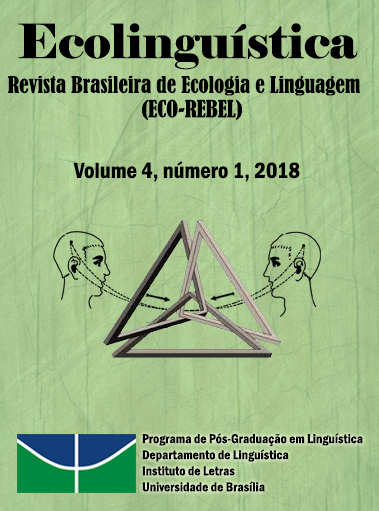INVENT LANGUAGE AND GIVE IT A NAME
Keywords:
Language; language practices; language representations; language names.Abstract
The objective of this article is to discuss speakers’ daily practices as well as their representations of laguages and of how they are used. These representations act on the practices, functioning as a fator of language change. They may also lead speakers to an linguistic security/insecurity which also acts on the practices and, consequently, on the languages themselves. The article also shows that these representations begin in the very name given to languages. Language is an invention that ends up by receiving a name.
Downloads
References
ACHARD, Pierre. Quelques propositions naïves sur le langage et la linguistique. Langage et Société 1, 1978.
BLEEK, W. Comparative grammar of South African Languages. Londres: Trübner, 1862.
CALVET, Louis-Jean. Pour une écologie des langes du monde. Paris: Plon, 1999.
CHAUDENSON, Robert. Les créoles. Paris: PUF (Coleção “Que sais-je?”).
LACROIX, F. Les langues bantu. In: Les langues dans le monde ancien et moderne: Afrique subsaharienne, pidgins et créoles. Paris: CNRS, 1981, p. 353.
WILLIAMS, G. Sociolinguistics: a sociological critique. Londres: Routledge, 1992, p. viii.
Downloads
Published
How to Cite
Issue
Section
License
Authors who publish in this journal agree to the following terms:
Authors retain copyright and grant the journal the right of first publication. The work is simultaneously licensed under the Creative Commons Attribution License allowing the sharing of the work with acknowledgment of the authorship of the work and initial publication in this journal.
Authors are authorized to enter into additional contracts separately for non-exclusive distribution of the version of the work published in this journal (e.g., publishing in institutional repositories or as book chapters), with acknowledgment of authorship and initial publication in this journal.
Authors are allowed and encouraged to post and distribute their work online (e.g., in institutional repositories or on their personal page) at any point before or during the editorial process, as this can bring about productive revisions as well as increase impact.
Citation of published works (See The Effect of Free Access).



3.png)



